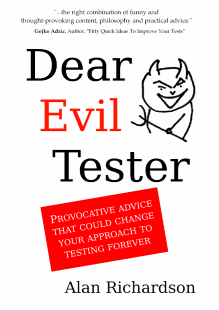TLDR; Don’t just ’learn automation’. Learn it for a reason.
When I attend conferences and meetups, people often ask me how they can learn to automate stuff.
I then have to ask some follow up questions. This is not my normal approach for a “Dear Evil Tester” answer.
A “Dear Evil Tester” answer makes assumptions and takes the question and the words in the question at face value. Because that is funnier, and allows me to address generic points. But doesn’t always target a specific person’s need.
When dealing with questions from people, I try to spend a little time understanding what underpins the question, to build a better model of their world, to try and provide an answer that helps them.
I might ask a few questions before making any statements. My first statements might be to check my model of their world rather than to start answering the question, and based on their response, I might ask more questions or start to answer their question.
Follow up questions to “How can I learn Automation?” might be:
- what do you want to automate?
- are you trying to automate something specific at work?
- what programming languages can you write code in?
- how will learning automation help you?
These questions give me answers like:
- I don’t have anything specific to automate, I just need to learn automation to keep up to date
- I’m between jobs and need to learn automation to get a new job
- I’ve been working with ‘vendor tool X’ but that isn’t a skill people want any more, I need to learn something else to get a new job
- I don’t know automation and I’m out of date
To generalise from the above list, and the unseen answers to the secondary questioning:
- I think that if I ’learn automation’ I can get a new job
- I want to keep my testing skills up to date otherwise I might night get another job
Each of these models requires a different answer to the question.
And note, these are not the only generalised model behind the questions, just the most common. Other generalisations I’ve encountered are:
- I want to add ‘automation’ to my skill set because I like staying up to date
- I have a specific problem at work and I think automation might help with that
- etc.
These models would require different answers.
But based on my last few conferences, and meetups, and looking in my email inbox, I need to answer explore the first 2 models first.
- I think that if I ’learn automation’ I can get a new job
- I want to keep my testing skills up to date otherwise I might not get another job
I agree that we need to have a profile that competes in the work marketplace. We have many ways to do that.
In fact, so many ways, that this blog post expanded to an uncomfortable reading length. So I will expand on the following points in individual posts (coming soon):
- if you want to find a job fast then focus on your strengths. Build an online portfolio that allows you to showcase them and link to it from your CV. You might want to list ‘objections’ to hiring you and do some work to offset them - and document this work in your online portfolio e.g. ’lessons learned when using tool X’. ’learn automation’ probably won’t help you in this situation.
- if you just want to stay up to date, then this is the best position to be in. You can actually use your existing job to help you do that. Experiment at work and make notes about what you learn. What good books did you read? What good videos helped? Build your portfolio as you go. The more you learn the more you will identify what you want your ’next job’ to consist of and that will help you focus your learning.
- ’learn automation’ for job hunting works best when you have a specific job in mind because you know exactly what you need to learn and you’ll have done some work already so you know what gaps you have in your learning or your approach to learning.
Most times people asking the question haven’t achieved a focus about what they need/want to do. And that is really the first step.
Some people might say “Ask yourself ‘Why?’ first”.
When we achieve focus:
- we can do specific work to address that focus.
- we can ask better questions of how to better do that work.
Read more in the other ‘Extended Answers’:
- “I think that if I ’learn automation’ I can get a new job - FAST”
- “I think that if I ’learn automation’ I can get a new job doing ’this’”
- “I want to keep my testing skills up to date otherwise I might not get another job”
For funny and thought provoking “Dear Evil Tester”" answers, read the book.








